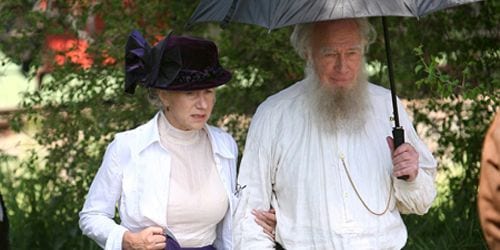
In an earlier epoch, The Last Station is the kind of movie that some striving studio mogul would snap up, stock with the best performers on his payroll, and assign to an A-list director, in order to play in packed theaters of adoring fans, and finally to triumph in the hallowed hall of the Academy Awards. Today, however, Jay Parini’s novel about the final days of Leo Tolstoy’s life has come to movie screens with less fanfare. These are different times, for better and — when it comes to films about dead artistes acted by quality thespians — for worse.
When the film opens, it’s 1910 and Tolstoy (Christopher Plummer) is in his twilight years. But instead of glorying over past accomplishments, the old man seems intent on embarking on an entirely new life as a Christian mystic. It’s not a development that his wife, the Countess Sofya (Helen Mirren), is particularly happy about, as she knows that his intent is ultimately to shed himself of as many worldly goods and desires as possible, very likely leaving her behind in a grand and empty old house with no way to support herself.
Our guide into this feud is Valentin Bulgakov (James McAvoy, ardent and pensive, as always), who arrives at Tolstoy’s estate to work as his personal secretary. (Bulgakov, like almost all of the major characters here, was a real person whose diaries served as sources for Parini.) A diffident true believer, Bulgakov is one of the so-called “Tolstoyans” who gathered around the old man in his later years, living in a rough commune where celibacy and vegetarianism were the order of the land.
Bulgakov is shocked at the man who greets him with a bear hug. This Tolstoy isn’t the methodical and abstemious master his disciples were modeling themselves after. Rather, with his long beard, rough clothes, and jolly demeanor, he seems half-monk and half-clown, a seeming contradiction translated with extraordinary clarity by Plummer.
The conflict over Tolstoy’s future rages around him, waged by proxies. The Tolstoyans, led by one Vladimir Chertkov (Paul Giammati), are fighting to allow him to dispossess himself, particularly concerning the copyright to his books, which they want him to sign away to the Russian people. Fighting them is Sofya, who seems motivated equally by her own self-interest and worry that he’s being manipulated by a cultish rabble. Bulgakov works the middle, spying on Sofya for Chertkov and trying to calm her frazzled nerves, even as her operatic impulses accumulate.
The Last Station would make for a satisfying historical drama if for no other reason than that Tolstoy’s later religious period and the ardency of his followers are very little known these days — not surprising given that the twin firestorms of World War I and the Bolshevik Revolution were just a few years away, giving this movement little time to take root. But the film runs into problems explicating the great man during this turbulent time of his life. By the time it starts, the Tolstoyan movement is well underway and we have no insight into why Tolstoy came to this great change. (Sofya points out that years earlier, he spent a good deal of time “whoring” in the Caucasus, and then making her read about it.)
This lack of understanding proves particularly problematic given the plot’s hinging on the fight over Tolstoy’s copyright. Because the argument to sign it over is made by Chertkov and others (including even one of Sofya’s daughters, who sees her mother as a drama queen, a not entirely unfair assessment) that it’s not clear why Tolstoy would want to do this. Sofya, whom Mirren inhabits as a vain and brittle battler, counters with sarcastic verbal jabs that help to deflate the Tolstoyans’ (and their leader’s) pompous declamations. That said, her over-the-top methods (such as attempted suicides and emptying a handgun into a portrait of Chertkov) weaken her case in the long run.
While the screenplay includes less-than-scintillating passages (primarily involving the copyright debate), writer/director Michael Hoffman uses his performers skillfully enough that he more than makes up the deficit. As a filmmaker, he’s skilled at corralling big ensembles into diagrammatic scenarios. In his better films from the 1990s, like Soapdish and A Midsummer Night’s Dream, he has also shown a wicked knack for slapstick, which comes in surprisingly handy during The Last Station, particularly with some of Sofya and Bulgakov’s scenes.
The Last Station ends in something of a mystery, as it should, given the strange circumstances of Tolstoy’s very last days. But before it gets there, the film spins a vivid story of the complicated, conflicting impulses displayed by the opposing forces gathered on Tolstoy’s estate, so desperate for something new to believe in that they can’t wait for their saint to die before they canonize him. Willing or not.

![Call for Papers: All Things Reconsidered [MUSIC] May-August 2024](https://www.popmatters.com/wp-content/uploads/2024/04/all-things-reconsidered-call-music-may-2024-720x380.jpg)



